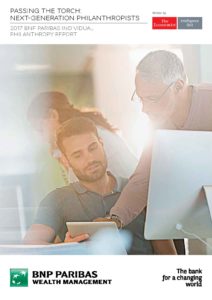“Unlike many older philanthropists, this globally connected and tech-savvy cohort is not content with just writing a charitable cheque. They see their skills, networks and for-profit investments as part of how they make an impact with philanthropy.” -The Economist Intelligence Unit
 What is this Report?
What is this Report?
Based on interviews conducted between November 2016 and January 2017 with affluent millennials and experts, the report assesses the shift in the approach to philanthropy by the next generation of affluent families, focusing on millennials engaged in family foundations. The report explores the millennial mindset, their investment tools and strategies, and the balance struck between family legacy and philanthropic innovation. The report defines millennials as those born between 1980 and 2000.
What are key findings from the article?
- Millennials are taking the reins. Though the bulk of wealth and charitable giving remains in the hands of older generations at this point, millennials are increasingly being given the reins of family businesses and foundations and becoming the decision-makers.
- Millennials believe in social entrepreneurship and are thus willing to support or invest in social enterprises and for-profit organizations, sometimes setting up their own. The sectors in which they invest include FinTech, EdTech, food/agriculture, and energy, and they are looking for sustainability – such as job creation and lifting individuals out of poverty. Meanwhile, traditional beneficiaries such as arts institutions are of less interest.
- Social media has inspired a global perspective. Social media, online news publications, and ease of travel have led millennials to take a more global, dispersed approach to philanthropy. And there’s a sense of urgency to their giving – they want to tackle problems now.
- Millennials are digitally social. Unlike previous generations, millennials like to use social media to announce the family foundation’s initiatives and achievements and to draw attention to their work. They are also open to collaborative approaches, often using social media to identify strategic partners.
- Impact investing is interesting. While family foundations often invest endowments in conventional instruments such as stocks and bonds, millennials are increasingly interested in innovative financing tools and impact investing. Impact investments are those made to organizations and funds with the intention of generating social and environmental impact alongside financial return.
- Millennials are unlikely to abandon traditional grant-making altogether. The report also notes that traditional grant-making and charitable giving is not expected to end as not all issues can be addressed through market-based solutions. Human trafficking and domestic abuse are cited as two examples. Moreover, social entrepreneurs require seed funding in early development.
- Millennials view legacy more in terms of actions than institutions. As for the balance between family legacy and philanthropic innovation, in general, millennials are less concerned with the formalities of passing a legacy onto the next generation than their elders; however, they are instilling an appreciation for philanthropy in their own children. Rather than family legacy, they think in terms of a legacy of giving where there is less constraint and more incentive to turn ideals into action.
What can I do as a result?
- Millennials care about being heard and being involved in good causes. Ask millennials for feedback. Even if the older generation is still the decision maker in a family foundation, engage the younger generation as they will be inheriting the reins before long. Ask for their feedback in terms of where they see the foundation going and what issues are important to them. Ask for feedback on how your institution might make improvements. Ask the millennials to volunteer for your organization.
- Millennials want to tackle causes they care about – now. Learn to utilize all forms of social media – Facebook, Twitter, Instagram, LinkedIn, etc. Establish your presence and contribute meaningful content that tells your story with a sense of urgency.
- In social media, find and follow foundations tackling the issues in your field. Comment on their posts so they begin to become familiar with your name and organization.
- Learn to use digital assessment tools to track your impact and then share that information. Again, you want to tell your story and your successes.
- If you’re in a traditional non-profit organization that doesn’t fall within the realm of social or environmental work, don’t despair. Think in terms of what might appeal to a millennial. Many arts and educational institutions, for example, offer programs for underserved youth. Trumpet the work you’re doing with those populations. You may find the funders following you on social media.
Additional Resources
- Passing the Torch: Next Generation Philanthropists | BNP Paribas Individual Philanthropy Report | 2017
- How Millennials are Changing Philanthropy | Justin Wheeler via Forbes | August 15, 2018
- Podcast: The Impact Millennials Will Have on Philanthropy | Sharna Goldseker and Michael Moody via The Chronicle of Philanthropy | February 9, 2018